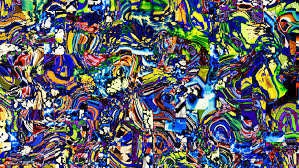记忆方法
chaos联想成“吵死”从而记住其“混乱”义
中文词源
chaos 混乱,混沌
来自PIE*gheu, 呵气,张嘴,词源同gas, yawn.神学术语。
英语词源
- chaos
-
chaos: see gas
- chaos (n.)
- late 14c., "gaping void," from Old French chaos (14c.) or directly from Latin chaos, from Greek khaos "abyss, that which gapes wide open, is vast and empty," from *khnwos, from PIE root *gheu- "to gape, yawn" (cognates: Greek khaino "I yawn," Old English ginian, Old Norse ginnunga-gap; see yawn (v.)).
Meaning "utter confusion" (c. 1600) is extended from theological use of chaos for "the void at the beginning of creation" in Vulgate version of Genesis (1530s in English). The Greek for "disorder" was tarakhe, however the use of chaos here was rooted in Hesiod ("Theogony"), who describes khaos as the primeval emptiness of the Universe, begetter of Erebus and Nyx ("Night"), and in Ovid ("Metamorphoses"), who opposes Khaos to Kosmos, "the ordered Universe." Meaning "orderless confusion" in human affairs is from c. 1600. Chaos theory in the modern mathematical sense is attested from c. 1977.
权威例句
- 1. Whatever troubles arise, we'll have peace of mind amidst seeming chaos.
- 无论出现什么样的麻烦,我们都会在貌似混乱的情形中保持平和的心态。
- 2. Many editorials express their anxieties about the economic chaos in the country.
- 许多社论对该国经济的混乱状况表示忧虑。
- 3. He needs them to stop the country sliding into chaos.
- 他需要他们来防止这个国家陷入混乱。
- 4. I think it's going to cause chaos personally but never mind.
- 我个人认为它会引起混乱,但是没关系。
- 5. The world's first transatlantic balloon race ended in chaos last night.
- 昨晚世界第一届跨大西洋热气球比赛在一片混乱中收场。

